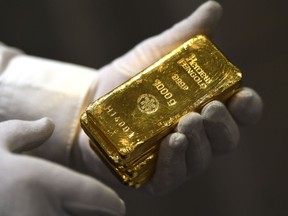Agnico Eagle’s ‘exceptional’ results elicit market shrug

High gold prices aren’t translating into higher share prices for miners

Article content
As investors work out whether they’re more concerned about the inflation or interest rate, it’s turning into a wild ride for miners such as Toronto-based Agnico Eagle Mines Ltd., which reported first quarter results on Thursday afternoon.
Advertisement 2
Story continues below
Article content
The company, which produces more gold in Canada than any other, reiterated production in 2022 should surge to at least 3.2 million ounces — up 60 per cent from the 2 million ounces record set in 2021 — despite lingering effects from COVID-19 that caused workforce disruptions at the start of the year.
It also announced adjusted earnings per share in the first quarter of 61 cents, beating consensus estimates of 39 cents, which Fahad Tariq, an analyst at Credit Suisse, attributed to “fundamentally … higher revenue and lower depreciation.”
Agnico’s freshly minted chief executive Ammar Al-Joundi, who took over in February after the unexpected departure of chief executive Tony Makuch just more than two weeks into the job, called the results “stellar.”
Advertisement 3
Story continues below
Article content
“We’re excited about where we are and we’re excited about where we’re going,” Al-Joundi said on an earnings call on Friday morning.
He added that costs came in lower than expected, which he called “exceptional” given inflation pressures, with the company reporting all-in sustaining costs at US$1,079.
We’re excited about where we are and we’re excited about where we’re going
Ammar Al-Joundi
Despite the fact that gold prices remain elevated at US$1,907 per ounce, investors have oscillated between jazzed and non-plussed. Agnico’s share price closed one per cent higher on Thursday, but its share price has slid 14.8 per cent since April 18 from $83.97 to $71.52 per share.
It mimics a broader trend sweeping across the gold industry. Gold hit an all-time high in August 2020, briefly breaking more than US$2,000 per ounce before settling to a range between US$1,700 and US$1,900 per ounce. But investors’ shine for gold mining companies quickly wore off and throughout much of 2021, share prices traded at levels similar to where they were when gold prices, and their profits, were much lower.
Advertisement 4
Story continues below
Article content
That all appeared to change in late January when Russian troops gathered on the borders of Ukraine, and eventually invaded the country. Amid subsequent western sanctions against Russia, and the trade disruptions it caused, gold prices shot back above US$2,000 per ounce in March.
Despite the fluctuations, the gold price remains far above the US$1,150 to US$1,300 per ounce range that dominated from roughly 2014 to 2019.

Nonetheless, the price of the VanEck Gold Miners ETF, a basket of the world’s largest gold miners, has been up and down. After peaking at US$42.94 per share in late July 2020, it slid down to US$29.30 — a 30 per cent drop, and around where it stood for most of 2019 when gold prices were hundreds of dollars lower.
Advertisement 5
Story continues below
Article content
But as Russian invaded Ukraine earlier this year, the index surged back up to US$40.86 in early April, only to spend the last few weeks sliding. It’s down 16.7 per cent to US$35.41 as of April 29.
Similarly, Agnico’s share price has gyrated, hitting a high of $109.74 in November 2020 before sliding all the way down to $59.04 as of Jan. 22. In recent weeks, it had been rising again but is down 15 per cent this month.
The fluctuating price of gold is largely tied to a stronger U.S. dollar and the potential for “aggressive rate hikes” by the central bank in the U.S., Credit Suisse analyst Tariq said.
“As we have written previously, weekly gold price oscillations seem to depend on which macro factors investors are focusing on that week — interest rates or inflation,” he wrote.
Advertisement 6
Story continues below
Article content
Gold typically benefits as a safe-haven asset in times of inflation, but that can be offset if the the U.S. dollar value rises with increased interest rates.
Agnico said it managed to keep inflation down by hedging its purchases of currencies and diesel, the fuel that powers much of its operations.
Weekly gold price oscillations seem to depend on which macro factors investors are focusing on that week — interest rates or inflation
Fahad Tariq
“These hedges have partially mitigated the effect of inflationary pressures to date and are expected to provide a degree of protection against inflation for the 2022 sealift diesel costs,” the company wrote in its press release.
In February, the company closed its blockbuster $13.5-billion merger with Kirkland Lake Gold, which has helped propel its guidance for 2022 gold production to record highs, although the quarter results do not reflect a fully merged company.
Advertisement 7
Story continues below
Article content
Kirkland’s chief executive Makuch was originally slated to be chief executive of the merged company, but quickly departed with no reason offered. Still, Al-Joundi, Agnico’s longtime chief financial officer and heir-apparent to the CEO spot before the merger, told shareholders “the integration has gone exceedingly well.”
Indeed, in the wake of Makuch’s departure, the company bumped up its estimates for pre-tax savings from general and administrative corporate synergies, from US$145 million in the first five years to US$200 million, and from US$320 million over the next decade to US$400 million.
-

Agnico Eagle announces surprise exit of CEO Tony Makuch amid earnings miss
-

Barrick CEO suggests miners overpaying for assets amid higher gold prices
-

How gold miners lost their mojo
-

Gold miners Agnico Eagle, Kirkland Lake propose $13.5 billion mega-merger
Advertisement 8
Story continues below
Article content
Meanwhile, estimates for operational synergies from the merger remain unchanged at about US$1.1 billion over the next decade.
It declared a 40 cents dividend.
Though the company announced lower first quarter net income of $109.8 million, down from US$145.2 million last year, it said its results were affected by COVID-19 challenges, inflationary cost pressures and costs related to its merger with Kirkland Lake.
On the positive side, the company said that the effects of COVID-19 — which had caused it to send its Nunavummiut workforce home in December 2021 — to prevent the inadvertent spread of the virus into the local community. But after consulting with the government, Agnico began returning its workforce in mid-March.
• Email: [email protected] | Twitter: GabeFriedz
Advertisement
Story continues below









